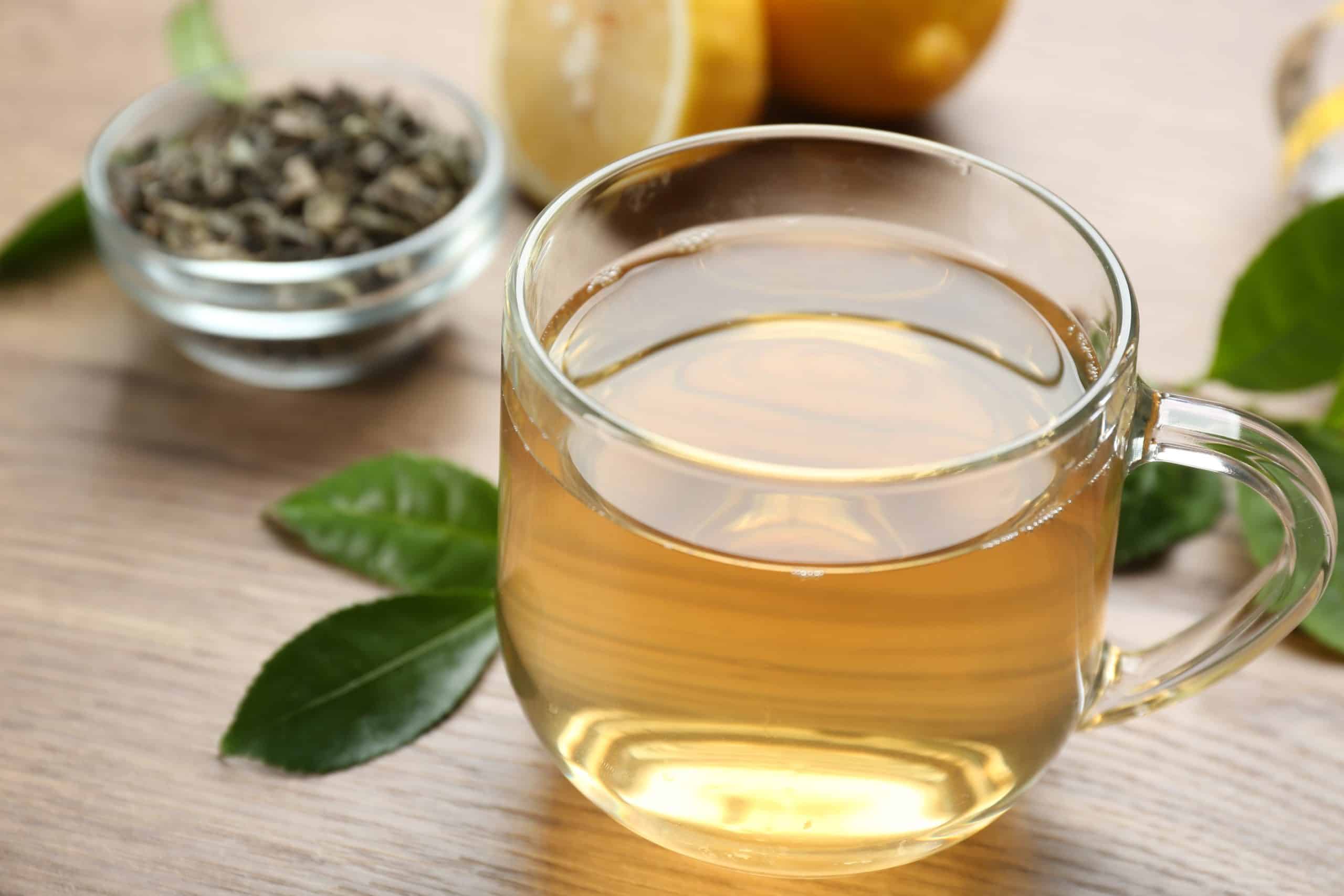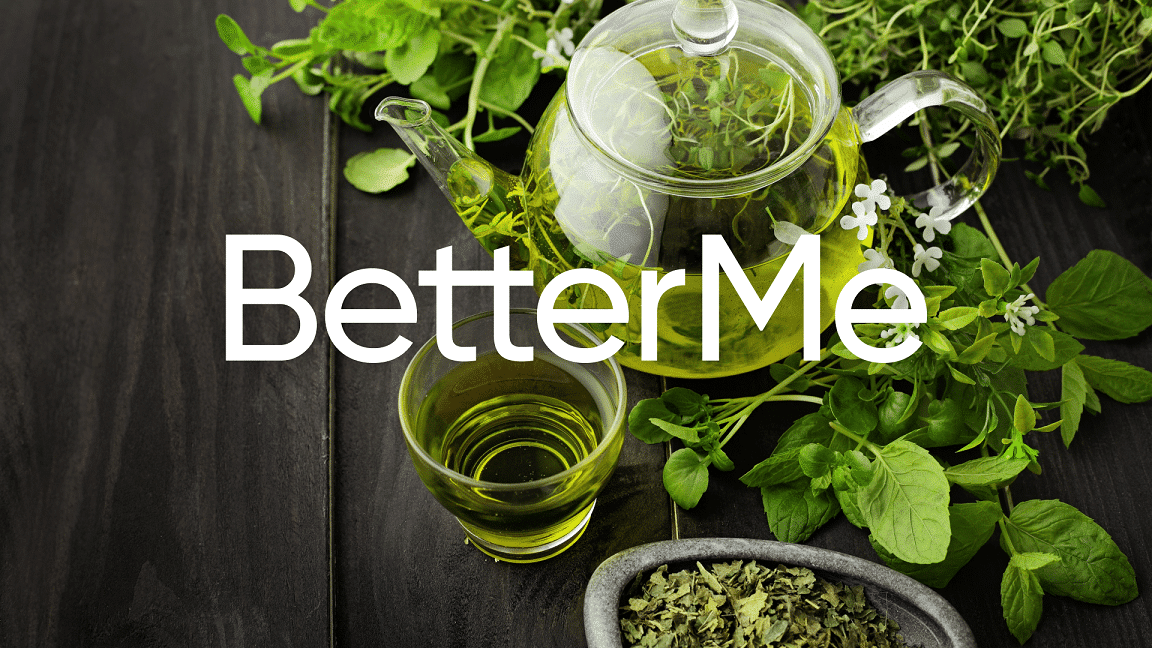The idea that weight-loss tea can burn fat overnight or melt your calories into submission isn’t realistic, to be sure. Still, you’ve heard that some teas have fat-burning, weight-dropping abilities. Are they true, and what does science have to say about tea for weight loss?
Science has plenty to say about weight-loss tea, but some factors limit the results. For example, omitting the dietary changes necessary to support sustainable weight loss may give you false hope. Let’s show you how to drink tea for weight loss and which ones to sip.
What Is the Best Tea for Weight Loss?
Weight-loss tea follows a bounty of small studies and some research suggesting that the following teas may help you lose weight as part of a balanced diet:
- Green tea (2, 8, 7, 1, 11)
- Black tea (26, 10)
- Oolong tea (4, 24)
- Puerh tea (22, 31)
- White tea (15, 23)
- Hibiscus tea (17, 9)
- Rooibos tea (12)
- Rosehip tea (5)
How to Use Tea to Lose Weight?
The best weight-loss tea to drink is any one of the above choices, along with realistic expectations, a well-balanced diet, and exercise. No one tea can magically make you lose ten pounds overnight. That said, these teas can be a part of a healthier weight management plan.
What do you need to lose weight while drinking these deliciously fragrant teas? Medical News Today suggests sustainable weight loss is an ongoing effort that requires lifestyle changes, some physical activity, and healthier food choices with moderate treats (30).
Ultimately, you should plan on eating more vegetables, fruits, whole grains, healthy fats, complex carbs, and lean protein. At the same time, avoid refined carbs, ultra processed foods, and high-sugar treats beyond moderation. Together with 150 minutes of moderate-intensity exercise weekly, will help put you on the right track for sustainable weight loss (6).
Furthermore, stress-reduction techniques, getting enough quality sleep, and being realistic about weight loss and management should contribute to your success (30, 6). Interestingly, a study in London confirmed that tea may reduce post-stress cortisol and promote relaxation (27).
Tea’s ability to reduce stress promotes weight loss when one is following lifestyle changes. With this in mind, let’s see which teas have the evidence to support weight loss claims. But first, let’s discover how to drink tea for weight loss.
BetterMe app will kick you out of the mental funk, shake off your extra weight, rid you off your energy-zapping habits, and help you sculpt the body of your dreams. Intrigued? Hurry up and change your life for the better!
How to Drink Tea to Lose Weight – Top 6 Secrets
Drinking tea to lose weight is simple when you follow these guidelines:
- Avoid adding sugar, as it adds calories which can contribute to weight gain and associated health risks (29).
- Avoid UK-styled milk in your tea because it also contributes calories and saturated fat, which is not a heart-healthy fat (14). Besides this it may cause symptoms if you’re lactose intolerant.
- Avoid eating high-calorie snacks with your tea, such as biscuits. Buttermilk biscuits could have 127 calories per cookie (3).
- Drink the recommended number of cups daily. For example, Medicine Net suggests 2-3 cups of peppermint tea daily (18). However, according to Stellenbosch University, you should limit caffeine-rich tea to a maximum of 8 cups daily, or fewer if you also drink coffee to avoid excessive caffeine intake (20).
- Wait 2 hours after drinking tea to eat anything iron-rich or drink tea 2 hours after eating iron-rich food, especially if you are at risk for iron deficiency. A review discusses that tea has the tannin compound, which attaches itself to iron and may prevent absorption (28). Simply give nutrients the time to absorb after meals.
- Compensate for the liquid calories you consume with tea. Note, a Canadian review shows that sugar-sweetened beverage intake was associated with higher body weight and BMI (25). If you drink your tea unsweetened and without added milk, it will have a negligible amount of calories which you don’t need to worry about(1).
5 Best Weight Loss Tea Options (Traditional Tea)
Let’s uncover the best weight-loss tea that works fast when eating a balanced diet. We’ll start with the most impressive traditional weight-loss tea. Discover more about green tea because it has more evidence to support it’s claims. All traditional teas come from the Camellia sinesis plant (2).
Green Tea for Weight Loss
Green tea contains catechins, natural antioxidants, including epicatechin (EC), epigallocatechin (EGC), epicatechin gallate (ECG), and epigallocatechin gallate (EGCG). Some of these compounds may have anti-inflammatory and anti-cancer effects (2).
Meanwhile, the EGCG antioxidant is the primary source of weight loss-related research. One 2020 review and meta-analysis of 11 studies found that green tea consumption was associated with positive changes in body composition, body mass index (BMI), and waist circumference in people with type II diabetes (8).
Furthermore, a 2021 review suggested that the EGCG catechins in green tea may increase an individual’s resting metabolic rate to burn more energy during rest (7). A faster metabolism burns more fat, glucose, and calories for energy while at rest. The results are promising, but not definitive.
A review in Nutricion Hospitalaria found that green tea’s EGCG compound is most effective for weight loss when there are 100-460 milligrams EGCG with 80-300 milligrams of caffeine daily over 12 weeks or more, especially when subjects did not have a high caffeine intake prior to the study (13). An 8-fluid-ounce green tea cup has 28 milligrams of caffeine (1). Drinking four cups every day provides 112 milligrams of caffeine to support the EGCG.
The results suggest that green tea may help you lose weight if you drink enough and account for the caffeine to help the EGCG catechins. Four cups meet the caffeine needs. Don’t overdo it, as you’ll discover some potential downsides soon.
Does Green Tea Burn Belly Fat?
Green tea might be a tummy fat-reducing tea, according to some evidence. A Chinese study found that drinking catechin-enriched green tea may reduce visceral fat around the middle (11). Visceral fat is stubborn and famously collects around your organs and in your belly. The results suggest catechin-enriched green tea may help burn belly fat.
More Green Tea Benefits
The best tea for weight loss and bloating may also be green tea. Chinese scientists found that green tea’s catechins may be beneficial for the gastrointestinal (GI) tract (21).
Green Tea Precautions
WebMD suggests drinking too much green tea may have undesirable side effects (1). Reduce how many cups you drink if you experience diarrhea, vomiting, nausea, heartburn, or an irregular heartbeat. Extreme green tea consumption may cause liver damage. Seek advice from your healthcare provider if you experience unwanted symptoms, and to find out if it is safe for you if you have any medical conditions or take any medications.
Black Tea for Weight Loss
Black tea is an oxidized version of the plant’s leaves with an intense flavor, but does it aid in weight loss? The fermentation process reduces the polyphenols in black tea. However, it still has EGCG and contains theaflavins, which may have weight loss benefits, according to a Japanese study (26). Theaflavins may fight obesity and have other health benefits.
Norwegian scientists found that drinking three cups of black tea daily for three months prevented weight gain and reduced waist circumference and waist-to-hip ratio (10).
Oolong Tea for Weight Loss
Oolong tea is popular for its intensity between green and black tea, and it’s semi-oxidized to maintain more polyphenols and antioxidants. A 2015 chemistry paper confirms that oolong tea has EGCG, theaflavin, theasinensins, and caffeine (4). These are the ingredients that may have potential weight loss benefits.
A Japanese study found that drinking oolong tea twice daily for 14 days increased fat-burning by around 20% without affecting energy expenditure (24). The study could have been longer, but it did suggest that short-term oolong tea intake might increase fat oxidation without affecting sleep.
Read more: Green Tea Intermittent Fasting: Benefits and Side Effects
Pu Erh Tea for Weight Loss
Pu Erh tea is similar to black tea but goes through a fermentation process. A Chinese study suggests Puerh tea extract consumption was associated with weight loss and an improved lipid profile (22). Individuals had improved triglycerides and an improved cholesterol to HDL ratio..
Also, the people experienced a lower appetite, which may help weight loss. Meanwhile, a Taiwanese study found that men with metabolic syndrome saw modest weight loss after using Pu Erh tea extract for three months (31).
White Tea for Weight Loss
This mild, low-caffeine tea is another option. White tea is the least processed and contains more antioxidants to possibly help you lose weight than most traditional teas, including the EGCG polyphenol (15).
A Chinese study on mice found that white tea may increase energy expenditure and fat burning, and also prevent the formation of new fat molecules for storage (23). In that it’s an animal study, human studies would be more encouraging. However, there remains promising preliminary evidence.
3 Herbal Teas That May Promote Weight Loss
Losing weight with herbal tea also requires following a healthy, nutritionally dense lifestyle (30). However, herbal teas show some evidence of weight loss benefits.
Hibiscus Tea
Taiwanese research found that Hibiscus sabdariffa extract may promote weight loss, reduce abdominal fat, and reduce the risk of non-alcoholic fatty liver disease (17). The extract’s polyphenols successfully reduced serum-free fatty acids (FFAs) to achieve the results.
Still, the study used the extract, not the tea, and only examined people over 12 weeks. However, a study on mice over two months showed similar results (9). More long-term research on humans drinking hibiscus tea should provide more actionable results.
Rooibos Tea
Rooibos tea is a famous South African herbal tea with intense fragrances. The color is as orange as a mild tea, but don’t underestimate the flavor. It has a fermentation process, which affects some of the natural antioxidants, but it retains something else in its favor.
A South African test tube study revealed that Rooibos tea encourages fat cells to produce more leptin to suppress hunger cues (12). The polyphenols and flavonoids in rooibos tea also reduced lipid accumulation in the cells by 22%. This exotic tea may help you burn fat and lose weight.
Rosehip Tea
Rosehip tea is another fragrant herbal option from edible rose petals and other plant materials. It has an odd reddish hue with a mild taste that holds potential benefits, especially if you’re battling stubborn visceral fat around your midsection.
A Japanese study examined 32 individuals taking rosehip extract daily over 12 weeks without other dietary interventions (5). The extract appeared to help reduce their BMI, body weight, and belly fat. The study was small, only lasting for three months, but it carries some promise and requires more research.
Lean and toned up body isn’t just a far-fetched fantasy. Check out the BetterMe app and watch it propel your weight loss journey into high gear!
For More Possible Weight-Loss Teas:
What Is the No. 1 Weight Loss Drink?
Stellenbosch University shines a realistic light on which drink is the ultimate choice for weight loss (20). Water is the ideal zero-calorie drink you can enjoy daily while trying to lose weight, stay hydrated, or remain healthy.
One healthy recommendation is 1 ml of water to 1/kcal to burn energy daily, which for many, results in eight glasses. Green tea without sugar or milk comes in at a close second because it has three calories per cup and evidence to suggest it aids weight loss (1, 2, 8, 7, 1, 11).
FAQs
Is it OK to Leave Tea Out All Day?
If your tea has milk or sugar added to it, leaving it out all day allows pathogenic bacteria to multiply in it, potentially making you sick if you drink it. If it is just plain tea with no additives, it isn’t as likely to harm you, but cooling and reheating tea might impact its taste.
Is it Good to Leave in the Tea?
In some cases, it may be good. Well and Good says it won’t be the world’s end if you leave the bag in too long (16). Some teas, like oolong, can steep for a long time, letting the cup reach its peak maturation to release the fullest potential of the antioxidants and other health benefits. Follow the package instructions because different teas steep for different times.
Is it Better to Leave the Tea Bag in Tea?
It depends on the tea you choose, as each steeps differently. Well and Good states that each tea steeps for a different amount of time (16). For example, green tea steeps fast, while oolong tea can steep for much longer. Leave the tea bag in oolong, but pull it out sooner for green tea.
Will I Lose Weight if I Stop Putting Sugar in My Tea?
You should leave sugar out of your tea if you wish to lose weight. Added sugar adds calories, which isn’t helpful for weight loss. Harvard suggests a high intake of added sugar may cause weight gain, inflammation, increased risk for diabetes, and heart disease (29).
The Bottom Line
Of the eight weight-loss tea options, you can enjoy one while following the safety guidelines and recommendations to support your weight-loss journey. Remember that you also need dietary changes, but go ahead and pick out your tea and discover how many pounds you can lose in a month.
DISCLAIMER:
This article is intended for general informational purposes only and does not serve to address individual circumstances. It is not a substitute for professional advice or help and should not be relied on for making any kind of decision-making. Any action taken as a direct or indirect result of the information in this article is entirely at your own risk and is your sole responsibility.
BetterMe, its content staff, and its medical advisors accept no responsibility for inaccuracies, errors, misstatements, inconsistencies, or omissions and specifically disclaim any liability, loss or risk, personal, professional or otherwise, which may be incurred as a consequence, directly or indirectly, of the use and/or application of any content.
You should always seek the advice of your physician or other qualified health provider with any questions you may have regarding a medical condition or your specific situation. Never disregard professional medical advice or delay seeking it because of BetterMe content. If you suspect or think you may have a medical emergency, call your doctor.
SOURCES:
- Are There Health Benefits to Drinking Green Tea? (2023, webmd.com)
- Beneficial Properties of Green Tea Catechins (2020, mdpi.com)
- Biscuits, Plain or Buttermilk, Commercially Baked, 1 Biscuit (n.d., urmc.rochester.edu)
- Chemistry and Health Beneficial Effects of Oolong Tea and Theasinensins (2015, sciencedirect.com)
- Daily Intake of Rosehip Extract Decreases Abdominal Visceral Fat in Preobese Subjects: A Randomized, Double-Blind, Placebo-Controlled Clinical Trial (2015, ncbi.nlm.nih.gov)
- Eating and Physical Activity to Lose or Maintain Weight | NIDDK (2023, niddk.nih.gov)
- Effect of Acute and Chronic Dietary Supplementation with Green Tea Catechins on Resting Metabolic Rate, Energy Expenditure, and Respiratory Quotient: A Systematic Review (2021, ncbi.nlm.nih.gov)
- Effect of Green Tea on Anthropometric Indices and Body Composition in Patients with Type 2 Diabetes Mellitus: A Systematic Review and Meta-Analysis (2020, pubmed.ncbi.nlm.nih.gov)
- Effect of Hibiscus Sabdariffa on Obesity in MSG Mice (2007, pubmed.ncbi.nlm.nih.gov)
- Effects of Black Tea on Body Composition and Metabolic Outcomes Related to Cardiovascular Disease Risk: A Randomized Controlled Trial (2014, pubmed.ncbi.nlm.nih.gov)
- Effects of Catechin-Enriched Green Tea Beverage on Visceral Fat Loss in Adults With a High Proportion of Visceral Fat: A Double-Blind, Placebo-Controlled, Randomized Trial (2012, sciencedirect.com)
- Effects of Fermented Rooibos (Aspalathus Linearis) on Adipocyte Differentiation (2014, pubmed.ncbi.nlm.nih.gov)
- Effects of Green Tea and Its Epigallocatechin (EGCG) Content on Body Weight and Fat Mass in Humans: A Systematic Review (2017, europepmc.org)
- Health Concerns About Dairy (n.d., pcrm.org)
- Healthy Properties of Green and White Teas: An Update (2017, pubmed.ncbi.nlm.nih.gov)
- Here’s How Long You Should Let Tea Steep for Maximum Health Benefits (2023, wellandgood.com)
- Hibiscus Sabdariffa Extract Inhibits Obesity and Fat Accumulation and Improves Liver Steatosis in Humans (2014, pubmed.ncbi.nlm.nih.gov)
- How Many Cups of Peppermint Tea Should You Drink a Day? (n.d., medicinenet.com)
- Is Reheating Tea Dangerous for the Body? (2020, timesofindia.indiatimes.com)
- News – How Much, and What Should We Drink Per Day? (2017, sun.ac.za)
- Pharmacological Effects of Green Tea on the Gastrointestinal System (2004, pubmed.ncbi.nlm.nih.gov)
- Reduction of Body Fat and Improved Lipid Profile Associated With Daily Consumption of a Puer Tea Extract in a Hyperlipidemic Population: A Randomized Placebo-Controlled Trial (2016, ncbi.nlm.nih.gov)
- Six Types of Tea Reduce High-Fat-Diet-Induced Fat Accumulation in Mice By Increasing Lipid Metabolism and Suppressing Inflammation (2019, pubmed.ncbi.nlm.nih.gov)
- Subacute Ingestion of Caffeine and Oolong Tea Increases Fat Oxidation without Affecting Energy Expenditure and Sleep Architecture: A Randomized, Placebo-Controlled, Double-Blinded Cross-Over Trial (2020, ncbi.nlm.nih.gov)
- Sugar-Sweetened Beverage Consumption and Weight Gain in Children and Adults: A Systematic Review and Meta-Analysis of Prospective Cohort Studies and Randomized Controlled Trials (2023, sciencedirect.com)
- Synthesis of Theaflavins and Their Functions (2018, ncbi.nlm.nih.gov)
- The Effects of Tea on Psychophysiological Stress Responsivity and Post-Stress Recovery: A Randomised Double-Blind Trial (2006, pubmed.ncbi.nlm.nih.gov)
- The Impact of Tannin Consumption on Iron Bioavailability and Status: A Narrative Review (2017, pubmed.ncbi.nlm.nih.gov)
- The Sweet Danger of Sugar – Harvard Health (2022, health.harvard.edu)
- Weight Management: Strategies, Lifestyle Changes, and Nutrition Tips (2023, medicalnewstoday.com)
- Weight Reduction Effect of Puerh Tea in Male Patients With Metabolic Syndrome (2014, pubmed.ncbi.nlm.nih.gov)










